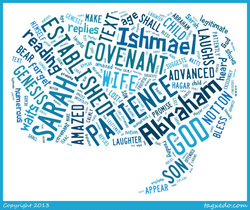 Today we end our study of Sarah. Let's look at her strengths and accomplishments. She was faithful to Abraham, following him wherever he went. She bore Isaac, nursed him, and raised him in her old age. She was loyal to Isaac and always wanted the best for him. She became the mother of a nation and ancestor of Jesus. She believed the promise even though all she ever saw was one son, Isaac, not the many who were to come. For this she is listed in the "Faith Hall of Fame" in Hebrews 11. And her weaknesses? She had trouble believing that the promise was for her. She tried to work out her own solution to God's promise of a son by giving Hagar to Abraham. She treated Hagar (and Ishmael?) badly. I guess like most of us Sarah is a mixed bag. She does the best she can according to the way she understands. She put her faith in God and her trust in Abraham. These accomplishments were enough to put her into the "Faith Hall of Fame" and to qualify her as one of our mothers. As Isaiah says, "Listen to me you who pursue righteousness and who seek the Lord: Look to the rock from which you were cut and to the quarry from which you were hewn; look to Abraham your father and to Sarah, who gave you birth (Isaiah 51:1-2). For reflection: Who are our mothers in the faith? What strengths of theirs did we pick up? How can we thank them? Let us pray. Father, I thank you for the mothers I have had, both natural and supernatural. I thank you for their strengths in . . . .
0 Comments
 A few years after Sarah gives birth to Isaac she demands that Abraham send Hagar and Ishmael away. In that way she can get rid of the evidence of her previous unbelief and eliminate any contention for Abraham's inheritance. God assures Abraham that he will take care of Hagar and their son, so Abraham does as Sarah wants. When Hagar's and Ishmael's supplies run out in the desert, God sends a heavenly messenger to provide for them and to reassure them that Ishmael will be the father of a great nation (Genesis 21:8-21). Like Sarah, who among us wants signs of our unbelief around to remind us on a daily basis that we didn't trust what God had promised? I surely don't. I like to pretend that I've always been a stalwart believer in everything God has said, and I have never questioned or doubted. The truth is I probably doubt something every day. Let's look at what has happened in the story, though. Neither Abraham nor Sarah is reproved for their doubts. God provides for Hagar and Ishmael. God keeps his promises. Since we are in Holy Week, I'll make comparisons around the death of Jesus. Peter doubts and denies he even knows Jesus. Peter goes on to be a great man of God. After the resurrection, the apostle Thomas doubts that Jesus is risen. Thomas goes on to be a great man of God. For reflection: How can I overcome my doubts? Let us pray. Jesus, I'm having a hard time believing . . . . Help my unbelief.  "The Lord dealt with Sarah as he had said, and the Lord did for Sarah as he had promised" (Gen 21:1). After all the travail of having the initial promise of a son for Abraham, the waiting, the birth of Ishmael by Hagar, Hagar running away and coming back, more waiting, God speaking to Abraham again and sending the three visitors so that Sarah could hear the promise again, we have a simple sentence. God did as he said he would. Abraham and Sarah rejoiced as Abraham named their son Isaac (he laughs). Sarah exclaimed, "God has brought laughter for me; everyone who hears will laugh with me. Who would ever have said to Abraham that Sarah would nurse children? Yet I have borne him a son in his old age." God did as he said he would. It is true for us too. All that God has promised us will happen in due time. This week we celebrate the fulfillment of another of the promises of God - that he would send a Savior who would set us free from the laws of sin and death. God did as he said he would. For reflection: How are we keeping the promises of God alive in our hearts? What promises has God already fulfilled in my life? Let us pray. Lord God, you are not only one who makes promises but one who keeps them. Thank you for the promises you have made to me, the promises already kept and the promises I know will be fulfilled because you made them. Holy is your name.  In Genesis 17 we saw Abraham's reaction to being told that he and Sarah would have a son in their old age. Now we see Sarah's reaction in Genesis 18: 1-15. The story is different. In chapter 17, it is God who speaks to Abraham directly. In chapter 18, three messengers arrive at Abraham and Sarah's campsite. They are welcomed and shown hospitality. Sarah begins to make bread; Abraham has a calf killed and prepared. Conversation ensues over the meal. Several anomalies occur in the story. The three messengers appear at Abraham's tent. Why didn't Abraham or one of the servants see them coming? How is it that they ask for Sarah by name? Both Abraham and Sarah are addressed by their new names, and yet Sarah doesn't seem to know that she is to have a son. In this version of the story, it is Sarah who laughs, not Abraham. Granted, she is more delicate in her laughter - she doesn't roll on the ground laughing as Abraham did. Finally one of the messengers, the one who promises a son, is identified as "the Lord." Speaking so that Sarah can overhear the promise, he tells Abraham of a son to be born in the next year. Let's apply a little imagination between chapters 17 and 18. What if, after God speaks to Abraham as recorded in chapter 17, Abraham tells Sarah of her new name and the requirement of circumcision as a sign of the covenant, but doesn't tell her about having a son and naming him Isaac? What if 99-year-old Abraham was afraid to talk to 90-year-old Sarah about having a baby? Then we see the necessity of the visit by the three messengers to reaffirm the message to Abraham and to allow Sarah to hear it herself. Now Sarah can join her faith to Abraham's in the conception of Isaac. Abraham and Sarah both need to believe the promise. For reflection: When has God been persistent with us in giving the same message over and over until we believe? What is the promise we have the most trouble accepting? Let us pray. God, you are the Father of promises and the Lord of truth. Help us to recognize, understand and believe the promises you have made to us.  In re-reading our text, Genesis 17:15-22, I am amazed at God's patience. God waits while Abraham laughs at the notion that he and Sarah will have a child at their advanced age. Then Abraham suggests to God that the covenant be established through Ishmael. God calmly replies, "No, but your wife Sarah shall bear you a son." So the covenant will be established through Isaac. However, God does not forget Ishmael. "As for Ishmael, I have heard you; I will bless him and make him fruitful and exceedingly numerous." God does not appear to be offended by Abraham's laughter nor by his suggestion that the covenant be established through Ishmael. He patiently explains that Abraham's legitimate wife, not Hagar, will have a son, as He said all along. It was Sarah who lost patience with God's promise and her infertility. God shows himself more patient than Abraham and Sarah both. For reflection: How and when has God been patient with me? Let us pray. Lord of Patience, thank you for all the occasions that you have been patient with me. . . . Forgive me for all the times I have been impatient with you.  "What's in a name? that which we call a rose by any other name would smell as sweet," so says Juliet to Romeo. Just in the last week we have seen that the Pope takes on a new name when elected. I've known adults who chose new names at baptism. What's with God changing Sarai's name to Sarah (Gen 17:15) which means princess? I suppose he is indicating a new role for her - from being barren to being the mother of nations. Now she is royalty. Sarah and her husband are starting a new dynasty. Isaac, Sarah's firstborn son (but not Abraham's firstborn son), is the proof that God's promises of land and descendants are true. God has proven himself in a most spectacular way. What other 90-year-old woman has given birth? So we see what an important role Sarah had in God's plan. Indeed, she was essential, as was Mary the mother of Jesus. We have two reflection questions today: What is my role in God's plan? What name does God call me? Let us pray. God, you called Sarah to a new role, even in her old age. Please allow me to serve you, even to the last day of my life.  Why is it that we hear of Abraham, the father of many nations, but not Sarah, the mother of nations? It really does say that in Scripture. She will be the mother of nations and kings of peoples will come from her (Genesis 17:16). God did not neglect to mention Sarah; why do we? Both Abraham and Sarah face a promise from God which seems absolutely impossible - they will have a son. They question it. They struggle with it. Abraham even rolls on the ground laughing at the very thought. Even so, God doesn't change his mind about using Abrahm and Sarah as the founding parents of the covenant. Today's reflection question is: What promise has God made to us that seems entirely impossible? Let us pray. Father of impossibilities, open our eyes that we may see the fulfillment of your promises.  Whereas God asked Adam and Eve, "Where are you?", his angel asks Hagar, "Where are you going?" When she tells him she is running away from Sarai, he tells her to go back. Go back into that abusive situation where Sarai is mean to her and Abram doesn't defend her. There is more bad news. Her son, whom she is to name Ishmael, will be a "wild ass of a man, with his hand against everyone, and everyone's hand against him; and he shall live at odds with his kin" (Gen 16:12). But there is good news too. The name Ishmael means "God hears", signifying that God heard her cries and knew her situation. Plus, she has the promise that God will multiply her descendants such that they cannot be counted. Then Hagar is so bold as to name God. She decided to call him "El-roi" which means both "the God I have seen" and "the God who sees me." I always thought Moses was brave to ask God his name, but Hagar out does Moses. She gives God a name. For reflection: What is my favorite name for God and how does it reflect my relationship with God? Let us pray. God, we thank you for hearing us, for knowing where we are coming from and where we are going. We thank you for seeing us and letting us see you. Help us to see you in all of life's situations and to hear your guidance as to what we should do.  Our choices sometimes have enormous consequences. Genesis 16:1-16 tells the story of Sarai and Hagar. Sarai, an old woman at this point and unsuccessful at bearing her husband Abram a child, gives her slave Hagar to Abram to bear a child in her place. Sarai made her choice; Hagar the slave had none. Hagar did as she was told. Neither woman appears to be a model of Godliness in this episode. When Hagar discovers she is pregnant, she gets uppity with Sarai. Sarai is confronted with the fact that the infertility in her marriage stems from her, not Abram. No woman wants to have that staring her in the face every day. And Abram refuses to get caught in the middle. Sarai treats Hagar so badly that Hagar runs away into the desert even though she is pregnant. We each are faced with decisions every day, large and small. Like Sarai, Hagar and Abram, we face the consequences of those choices. But what do we do when those consequences are not what we anticipated? Do we take our frustrations out on others, as Sarai did? Do we wash our hands of them like Abram? Or do we run away? Let us pray. God of Sarai, Hagar and Abram, we have made some poor choices in our lives. We want to fix the damage we have caused. How do we make amends? (Your comments are welcome.)  In the passage we last considered (Genesis 3:1-13), there is a question which should not be overlooked. God asks Adam, "Where are you?" Adam and Eve are hiding after they have sinned, and, in response to God, Adam admits he is afraid. Adam and Even had only "been away" from God for a day or perhaps even less. Yet they were already afraid to seek God out. So God went looking for them. No matter how long we may have been away from God, he is seeking us every day, every hour. We don't need to be afraid to say, "Here I am" because he loves us. |
AliceI started this website and blog on May 1, 2012. I am a Catholic who has been in ministry for many years. I first developed what I would call a close relationship with Jesus in the early 1970s. Ever since then I have been praying with people for healing and other needs. It is because I have seen so many of these prayers answered that I am so bold as to offer to pray for you individually through this website and phone line. Archives
July 2021
Categories
All
|
Proudly powered by Weebly

 RSS Feed
RSS Feed